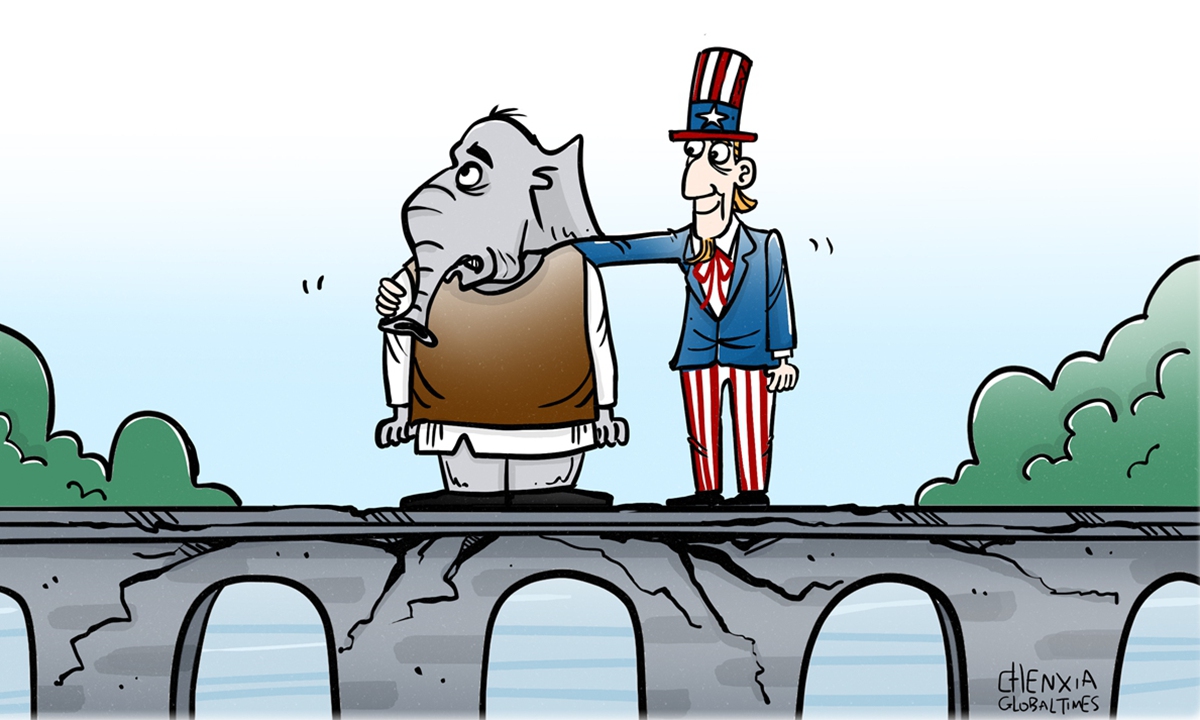
A view of Beijing (left) and New Delhi (right) Photos: VCG
Editor's Note:How China-India relations will evolve in 2024 has been closely watched by observers from both sides. As India's general election approaches in 2024, what changes may be brought about in China-India relations? How should we understand the subtle and volatile attitude of the US toward India? At the beginning of the year, Indian authorities caused a stir as they made moves against Chinese companies. What are the underlying reasons for the recurrence of such incidents? Sudheendra Kulkarni (Kulkarni), former political advisor to late prime minister Atal Bihari Vajpayee and the founder of the Forum for a New South Asia, shared his thoughts with Global Times (GT) reporter Wang Zixuan on the role the two Asian giants can play to maintain regional stability as well as his hopes for bilateral relations in the new year.
GT: In a recent interview, you mentioned that any country that seeks hegemony is witnessing a prelude to its decline and "India has a lesson to learn." Why do you think this? What can countries learn from this in their development and foreign policy?
Kulkarni: If we look at the modern history of the world, any country that has exercised or sought hegemony has ultimately suffered decline. At one time, the UK had an empire that spanned almost the entire world, but where is this empire today? In our times, we have seen the US acting as a global hegemony. We are now witnessing the US in a phase of irreversible decline. It's only a matter of time before the US ceases to be the largest economy, and loses its military and political dominance over the world. This is because it followed a foreign policy of lording over the rest of the world. It completely goes against the beliefs of our civilization.
Therefore, this serves as a lesson for all emerging nations, such as India and China. We have to take a lesson from world history and never seek hegemony. We believe in what Chinese President Xi Jinping calls a global community of shared future, in which there is absolutely no room for hegemony. Similarly, at the G20 New Delhi Summit last year, India talked about "One Earth, One Family, One Future." I believe that India and China, as two rising nations, should set a better example for the rest of the world, where we can cooperate to create a peaceful and harmonious world order.
GT: On January 2, Indian External Affairs Minister S Jaishankar said that?India-China relations all depends on "what is the Chinese policy" and India should deal with China on the basis of "realism." What does India's realism mean? What changes may be brought about in India-China relations?
Kulkarni: I believe that the foreign policy of any country, especially countries like India and China, should be guided not only by realism, but also by idealism.
If a big country does not follow high ideals in its foreign policy, then it is doing a disservice to the global community. High ideals entail promoting peace, cooperation and harmony in the world, and believing that disputes and differences can be settled through dialogue, rather than military intervention. It is absolutely necessary not only for India and China, but also for the US and other countries to follow certain universal ideals. It is also necessary for countries to be realistic, because we are all living in a world where there are divergent interests, and these interests need to be managed properly with a sense of realism and with our feet on the ground rather than being starry-eyed.
As far as China-India relations are concerned, realism requires India to acknowledge that China, our largest neighbor, is not just an important economy, but also has a growing say in global affairs. So, our foreign policy should recognize this reality. This is what I mean by realism. Similarly, China should also be realistic. India, China's southern neighbor, is also a rising nation, and the two countries have cooperated with and learned from each other for centuries.
As a result, India and China cannot be rivals. We should establish a good-neighborly relationship based on our core national interests. This is what I mean by harmonizing idealism and realism in our foreign policies.
GT: Competition, cooperation or conflict, which will dominate the relationship this year? How should China and India maintain the stability of bilateral relations?
Kulkarni: There will be competition between India and China, but also a significant amount of cooperation. But I don't see any conflict, because conflict between India and China will be very costly for both sides. We must avoid conflict at all costs, and we should have the wisdom to avoid conflict and expand the scope of cooperation.
GT: The US has been trying to draw India to its side. What negative impact do you think this will have on the situation in South Asia? How should China and India work together to promote regional peace and stability?
Kulkarni: Now, the world order is changing very fast. The dominance of the US is declining irreversibly, and it is fearful of losing the global dominance. So, the US is seeking new allies to somehow create a coalition that can counter and contain China. India must not be part of this effort at all.
As I said, China-India relations should be looked at completely independent of India-US relations. India and China are going to be neighbors forever; this geography cannot be changed. Therefore, neighbors have to live in peace and cooperation. Sometimes differences and disputes arise, but these disputes should be settled through dialogue. Unfortunately, the Western powers, fearful of losing their dominance and fearful of the rise of Asia, are trying to split Asia.
They are talking of the Pivot to Asia and Asian NATO. NATO has already caused so much havoc in Europe. Why should we invite NATO? Therefore, I repeat India-US relations should be purely an economic relationship, without a military component at all. At the same time, it is also necessary for India and China to stabilize our relations, not only for our mutual good, but also for stability in our region.
GT: Biden has declined the invitation to participate in the Republic Day celebration in India in January. Some observers have said this implies the end of the honeymoon period between the US and India. How should we understand the subtle and volatile attitude of the US toward India?
Kulkarni: So many honeymoons have been talked about. I don't think that is the right way to describe India-US relations. India-US relations should be constructed on the basis of mutual respect, mutual benefit and benefit for the entire world.
The US has achieved many spectacular successes in many fields, but it has to completely change its outlook toward the world. It must stop its warmongering and military might. Who is threatening the US security? Why does it have military bases all around the world? There is a need for the American leaders and American people to understand that the world is changing.
2024 is a year of presidential election in America. Since President Joe Biden is seeking reelection, he might be busy. But it is indeed true that the warmth in India-US relations has come down. India is asserting its independence in foreign policy. Just recently, India has consolidated the traditionally close friendly relations with Russia. All of us know that China-Russia relations are very good, which means that the future is bright for relations between India, China and Russia. If this triangle becomes stronger, the US will not be able to split up the Asian countries and Eurasian countries. We hope that the US returns to realism about the changing world order after the presidential election.
GT: Three top executives of vivo India were arrested in recent days. Since 2020, more than 200 Chinese apps, including TikTok and WeChat, have been banned on the grounds of "national security." Some argue that India treats economic issues as political competition. What are the underlying reasons for the recurrence of such incidents? What should be done to minimize or avoid such incidents in China-India economic cooperation?
Kulkarni: Unfortunately, the economic relations between India and China have taken a negative turn. That is a tragic development. It has pushed China-India relations back by many years. The two countries had a fallout in terms of India taking a very strong stand on Chinese investments and Chinese businesses in India. But I hope that as soon as our political relations improve, the examples that you mentioned will also see resolution because the Chinese companies can contribute to India's economic development. India needs more investment and Chinese technology. At the same time, China should also create an atmosphere which is good for both countries. It is going to be win-win for both India and China.
GT: Many Indian experts on China are mostly above 50 years of age, and there are fewer "China experts" in India now. What are your thoughts on this phenomenon and its implications for bilateral relations?
Kulkarni: Despite centuries of close interaction between India and China, today Indian scholars' knowledge of China is lacking. Before the China-India war in 1962, there was a lot of interaction and mutual learning, but this has not kept pace. Now, as you pointed out, the generation of scholars in India who have expertise in China is getting old. We need new people, and we must create opportunities for them.
Unfortunately, the situation has become so bad over the past two years. Today, there are practically no Chinese journalists in India, and vice versa. This is absurd. We should know each other through our own eyes. If we meet each other, the areas of agreement will increase, and the areas of disagreement will shrink.


